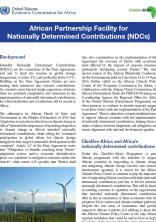Africa Partnership Facility for NDC

Intended Nationally Determined Contributions (INDCs) are the cornerstone of the Paris Agreement, and aim to limit the increase in global average temperature, to below 2°C, and preferably below 1.5°C. Building on the Paris Agreement, Parties are now turning their intentions into concrete contributions. As countries move beyond simple expressions of intent, there are potential complexities and intricacies in the implementation of nationally determined contributions, for which facilitation and coordination will be crucial in Africa.
The affirmation by African Heads of State and Government in the Malabo Declaration of 2014 that “adaptation is a priority in all actions on climate change in Africa” reiterated the importance of including adaptation to climate change in Africa’s intended nationally determined contributions, while calling for “continued participation in global efforts for climate change mitigations that support sustainable development in the continent”. Article 4.7 of the Paris Agreement states that “Mitigation co-benefits resulting from Parties” adaptation actions and/or economic diversification plans can contribute to mitigation outcomes under this Article”, while article 4.15 specifies that “Parties shall take into consideration in the implementation of this Agreement the concerns of Parties with economies most affected by the impacts of response measures, particularly developing country Parties.” The sixth special session of the African Ministerial Conference on the Environment, held in Cairo from 16 to 19 April 2016, further called on the ‘African Climate Policy Centre of the Economic Commission for Africa, in collaboration with the African Union Commission, the African Development Bank, the NEPAD Planning and Coordinating Agency, the Regional Office for Africa of the United Nations Environment Programme and other partners, to continue to provide targeted support to member States with the implementation of the Paris Agreement’. There is, therefore, a clearly established need to support African countries with the implementation of nationally determined contributions, helping them to strike a balance between adaptation and mitigation and ensure alignment with national development agendas.